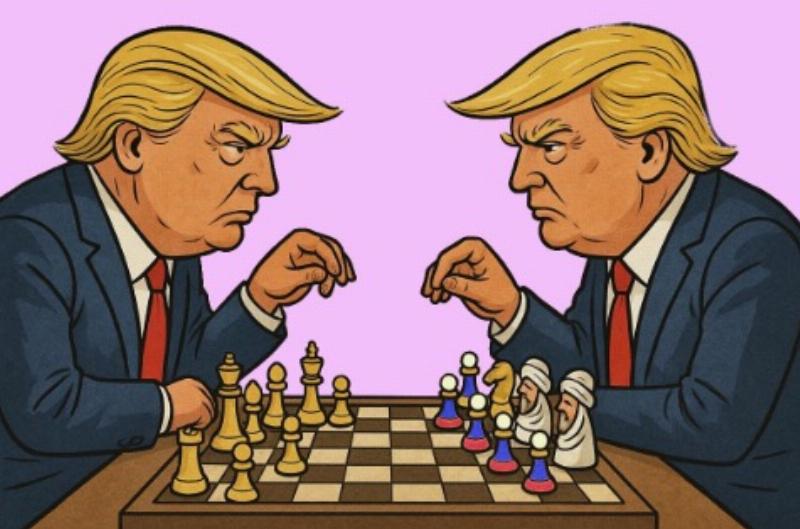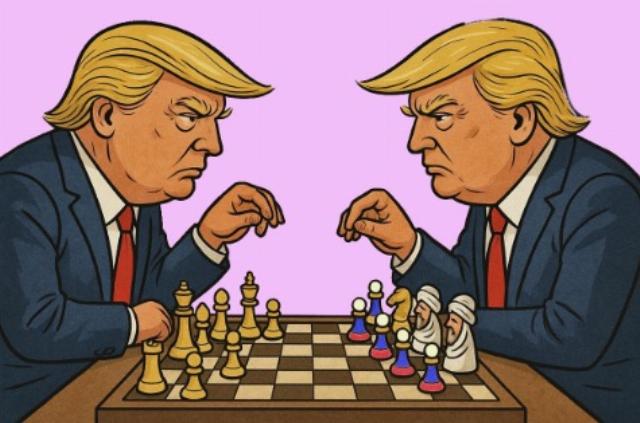


Trump’s seemingly respectful attitude towards the war criminal Putin caused bewilderment in many. The most fantastic assumptions were made, but without any evidence. In some delusional heads, explanations were born, such as that Trump was recruited by Russia and dances to Putin’s tune. Others, who are not burdened with analytical abilities, assure that Trump is simply stupid, illiterate, and captive to his own fantastic illusions. I do not consider my readers, nor Trump, stupid, so let’s try to understand together what drives him in his international politics. Here is a brief overview of two global problems that he is trying to solve.

Image created by Jacob Fraden.
Muslim expansion. In 635 A.D., just three years after Mohammed’s death, the armies of the Holy Crescent invaded Christian Syria and Christian Palestine. In 638, they took Jerusalem. Two years later, they conquered Persia, Armenia, and Mesopotamia (present-day Iraq), and invaded Christian Egypt. For the next 800 years, they triumphantly marched through Eastern and Western swaths of Europe with incredible cruelty, pronouncing the name “Jesus” meant immediate execution, and the Jews were reduced to a humiliated state of “dhimmi.”
The teachings of the Qur’an about taking over the entire world led to many wars, millions of victims, and untold suffering until the Reconquista took over, and the conquest of the world was halted. Today’s invasion of Europe by Islam is nothing less than a revival of this religious colonialism through mass migration to change demographics in its favor.
In the Middle East, the intifada is characterized not only by modern-day Suleiman the Magnificent, such as Iran’s ayatollah, but also by the “Palestinian people” (the “nation” invented by KGB strategists) and other Muslim thugs. Iran, with its desire for hegemony in the Middle East through its “proxies,” is the root of all the problems in this region. For them, Israel is a stumbling block on the way to the cherished Shiite dream of conquering the world, so its destruction is the number one task.
Chinese expansion. In the Middle Ages, China had no interest in overseas countries. However, this changed after 1949, when the People’s Republic of China was formed and Mao established a brutal dictatorship comparable only to Stalin’s USSR and today’s North Korea. Like all authoritarian regimes, China became obsessed with the idea of spreading its influence around the world.
After Mao’s death, China was transformed from a hardline communist dictatorship into a Chinese version of fascism. Let me remind you that the economic difference between the communist system and the fascist one is that under the former, all the means of production belong to the state, while under the latter, these means are in private hands, but under strong state control.
This transformation led to a rapid economic take-off. In just two decades, China has become a giant factory, producing for the rest of the world everything from shoelaces to steel to computers. The growth of Chinese wealth stirred up communist dreams of conquering the world.
China’s current leader, Xi Jinping, has secured lifelong rule and developed a plan for global expansion. Because the plan is based on the economic conquest of other countries, the Chinese economy began to move from low technology (tailoring, umbrella making, etc.) to high technology (computers, AI, shipbuilding, etc.). China’s immediate goal is to become a technological and industrial superpower, bypassing the U.S., Japan, and European countries.
In pursuit of this goal, China quietly began to buy real estate around the world and acquire strategically important facilities in South America, Africa, Australia, and Greenland. Taking advantage of the political ineptitude of the Russian leadership, China is quietly populating the eastern regions of Siberia and the Far East, which turns these vast Russian territories into Chinese provinces.
The summit of the Shanghai Cooperation Organization has just ended in Tianjin. Its participants sought to prove that China is the new world leader, Russia is not isolated, and Europe and the U.S. have been pushed to the sidelines of history. Sweet self-gratification!
In fact, the summit was a congress of Eastern dictators. Like all dictators, Xi Jinping loves military parades, so a grandiose parade–ballet was arranged under the pretext of the 80th anniversary of the victory over Japan. This victory was attributed exclusively to Mao’s army, completely ignoring such a “trifle” as the Kuomintang of Chiang Kai-shek and the U.S., with all the Pacific allies, just as Russia today attributes the victory over Hitler exclusively to itself, ignoring the colossal economic and military contribution of the U.S. and Great Britain.
Trump’s countering. The desire for world domination of Shiite Islam and fascist China is clear to the American president. Trump is determined to counter this, using all the economic and military power of the United States. All his steps in the international arena and within the country are aimed at achieving this goal.
In the Middle East, working with Israel, the United States dealt a powerful blow to the Iranian nuclear project. Back in 2018, Trump withdrew from the nuclear deal with Iran (JCPOA) and imposed serious sanctions on the country of the ayatollahs, which were then eased by Biden, but have now been reinstated.
To weaken Iranian influence, Trump supports the Abraham Accords between Israel and moderate Sunni states, such as Saudi Arabia, Egypt, and the UAE. He is also insisting that Israel put an end to Hamas as soon as possible. Trump proposed resettling Palestinians from Gaza to unpopulated areas of the Middle East, but the idea did not gain support from Arab states. No one wants to admit a people whose only skill is killing.
As for China’s creeping expansion, Trump has a headache here because the neo-fascist state of Russia, which has been waging a senseless war against Ukraine for the fourth year now, stands in the way. Trump really wanted to stop this war, not only for humanitarian reasons, but also because it would make his confrontation with China more successful.
But for China, the Russian permanent war is very beneficial for two reasons. Firstly, it facilitates Chinese penetration into Siberia, and secondly, it distracts the efforts of the United States and Europe from opposing Chinese expansion. Therefore, China will support Putin in this war in every possible way, even by military means.
In confronting China, Trump wants to get Russia out of the way, for it’s a troubling point in the Pacific. From the first days of both his terms, Trump tried to pull Putin away from China. Being a narcissist himself and believing Putin to be the same (not without reason), he tried by all means to cajole, caress, and charm him.
Naturally, the effective method to win Putin over to his side would be to stop any aid to Ukraine, but for Trump, this is a completely unacceptable move for both moral and practical reasons. Breaking with Ukraine is a weak strategy in the long run, and Trump is well aware of this. Yes, Putin would move away from China and even become friends with America, but only for a short time, and then he would revert.
Besides, the surrender of Ukraine would mean the loss of Europe as an ally. So, the task is not an easy one, and to solve it, Trump tried to sit on two chairs: helping Ukraine and charming Putin.
The recent summit in Tianjin made it clear to Trump (I hope he saw it and swallowed the bitter pill) that Russia is no longer a country looking to the West, but a horde looking to the East. Whatever hopes Trump had that Putin would listen to him and stop the war have completely failed. Aggression against Ukraine will continue, and there will be no peace in the near future. Trump will have to admit his defeat in the game of “Charming Putin” and think hard about how to change the strategy.
In addition to what Trump is already doing, it would be essential to increase the sale of long-range high-precision weapons to Ukraine, while removing any restrictions on their use against Russia. I am sure that powerful strikes on, say, the Russian Ministry of Defense in Moscow would have ended the war within a few days.
These September days may become a turning point in Trump’s political game, and in his own words, “we’ll see.”
Author’s website: www.fraden.com
